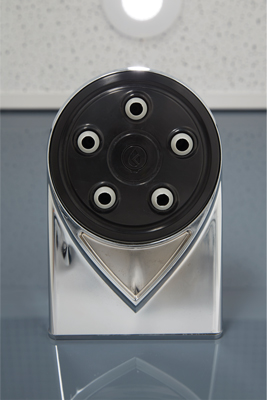
Power shower reduces water use by 50 per cent
 A new power shower that reduces water use by 50 per cent and requires less energy has been welcomed by a Midlands expert.
A new power shower that reduces water use by 50 per cent and requires less energy has been welcomed by a Midlands expert.
“This cheaper and environmentally friendly idea could revolutionise homes and businesses as well as cutting our carbon footprint,” said Ron Fox, of Noreus Ltd at Keele, Staffordshire.
It’s the brainchild of Chris Jackson’s company Kelda Technology and his former business partner, Chris Honeyands, who has now moved on to another project. They were trying to extract harmful particles from smoke when they stumbled on a method to make water jets more powerful.
Already the project has government support with £480,000 from the Department for Energy and Climate Change’s Energy Entrepreneurs’ Fund and £75,000 from the Carbon Trust while venture capitalists Radius Equity and 24 Haymarket are backing the idea with £3 million.
The invention works by adding water to an airstream in the showerhead. As it passes through a narrowed tube it is then broken into droplets to form a spray which then flows through five “acceleration chambers” shaped like jet engines to create a force that has 2.4 times the power of a traditional shower.
Chris Jackson (www.keldatechnology.com) added: “The tube works like a carburettor in a vehicle which optimises the amount of fuel that goes into an engine.”
He added that traditional showers, which have barely changed over the last 40 years, would use anywhere between eight and 15 litres of the world’s most precious resource every minute. His invention can reduce that by half and still leave customers feeling that they have had a proper wash.
 Health benefits
Health benefits
Two health benefits of the Kelda shower is that it is less likely to build up limescale because the showerhead has larger holes and also research by Southampton University has shown it lowers the risk of transmitting Legionnaires’ disease because the water droplets are much bigger.
It will particularly help public gyms, hotels, hospitals, student accommodation blocks and leisure centres with their big use of water and high shower operating costs and also overseas countries with acute water shortages and droughts.
The company is now working on a version for domestic bathrooms.
Ron added that householders as well as saving on water costs could cut their bills on heating the shower even further by adding a thermodynamic solar heating system to their home.
It work like refrigerators in reverse in that it extracts heat from the outside air in the same way a fridge takes heat from its inside and the panels then convert the refrigerant into a gas. This then passes through a compressor, which runs on electricity to boost its temperature and is then used to heat the water.
The refrigerant enters the panels at a temperature of between -20C and -30C, so even on cold days they can absorb relative warmth from the air.
Any residents wanting advice about green energy should call Ron on 01782 756995 or go to www.noreus.co.uk




